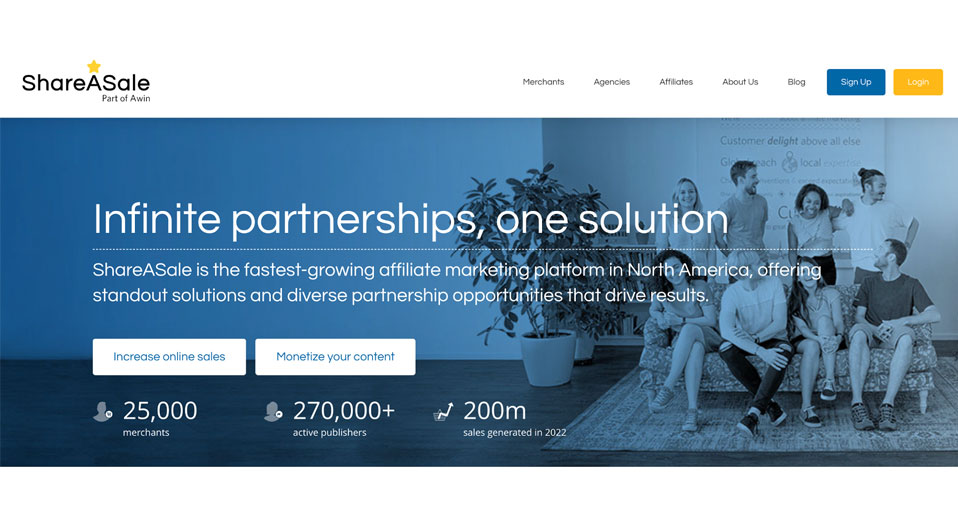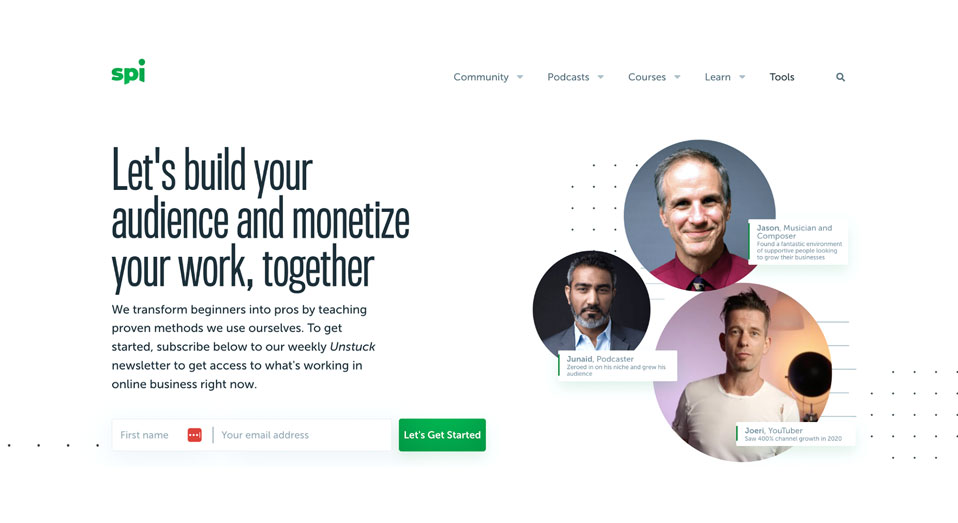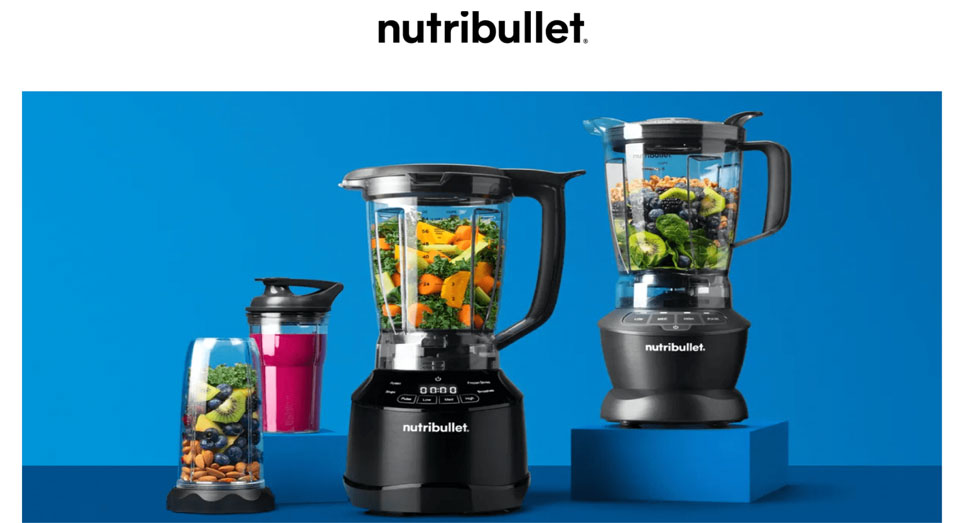11 Powerful Affiliate Marketing Strategies For Success
Learn about several affiliate marketing strategies that successfully guide buyers to your business, providing you with long-term sales and sustainable ROI.

In the dynamic world of digital marketing, finding a strategy that truly pays off is like striking gold —and affiliate marketing is your pickaxe.
At its core, affiliate marketing is a cornerstone of a brand’s ecommerce strategy. It’s a partnership model where publishers promote your brand’s products or services.
The clincher? You only pay affiliate commissions when a customer completes an action, such as a sale or a sign-up. It’s a model that emphasizes efficiency, cost-effectiveness, and, most importantly, results.
But why does this matter to you? It’s simple: your products may be top-notch, but without a strong affiliate marketing strategy, finding the right customers is like searching for a needle in a haystack. Affiliate marketing guides those buyers to your business, promising long-term sales and sustainable ROI.
The numbers speak for themselves: over 80% of advertisers use affiliate marketing services, generating an impressive $27 for each dollar spent. And with affiliate programs capable of boosting a brand’s revenue by up to 30%, having a solid affiliate marketing strategy is vital for success.
Read on to learn about the different affiliate marketing strategies available to you and how to implement them into your overall marketing efforts to drive your brand growth forward.
What is Affiliate Marketing and Why is a Strategy So Important?
Affiliate marketing is a powerful, performance-based channel at the forefront of a brand’s ecommerce strategy. It’s a strategic partnership where publishers earn a commission by promoting a brand.
The publishers, known as affiliates, use an affiliate link (essentially a tracking link) placed on a brand’s homepage in their marketing efforts. Each time an action—a sale, conversion, sign-up, or download—is completed, the publisher receives a payout. It’s a model where you pay for performance, not just the possibility of performance.
But why is a well-thought-out affiliate marketing strategy so pivotal for brands? The answer lies in its ability to generate qualified traffic, which is vital for creating a sustainable return on investment.
The best affiliate marketing programs not only increase brand visibility but also lead to a significant boost in long-term sales. And in the dynamic world of ecommerce, these benefits of increased reach and improved sales are invaluable.
Who Are the Players Involved in an Affiliate Marketing Campaign?
Part of creating an effective affiliate marketing strategy is understanding the key roles involved. Here are the four principal players:
- The Merchant (that’s you!): Also known as the creator, the seller, the brand, the advertiser or the vendor, is the party that creates the product or service. Anyone with a product can become a merchant in affiliate marketing, from solo entrepreneurs and small business owners to large corporations
- The Affiliate: Sometimes called the publisher, the affiliate can be an individual or a company that markets your product or service in an appealing way to potential consumers. Affiliates often have a specific audience to whom they market, usually adhering to that audience’s interests. They’ll get paid affiliate income if and when their audience takes action
- The Consumer: The driving force of affiliate marketing, consumers are the system’s lifeblood. They flow through the affiliate marketing system, from the affiliates’ webpages clicking links to making purchases. Their actions—clicking on an affiliate link and making a purchase—lead to shared revenue.
- The Network: While not always included as a distinct entity, the network is an intermediary between the merchant and the affiliate. This can include everything from ensuring payments are made to providing affiliate links. For many affiliates, networks simplify the process with their marketing software and provide them with a range of merchants seeking affiliate marketing opportunities. Some examples of networks our affiliate marketing agency works with include Rakuten, Impact, and CJ.
Each player has a critical role to play, and the synergy between them drives the success of your affiliate marketing strategy. Ready for some affiliate marketing tips? Let’s dive into how it works. Let’s see how these players come together with some examples of affiliate marketing and the strategies in action.
Learn how Gen3 helped World Wide Stereo
increase Average Order Value by 30%
1. Diversify Your Affiliates
In affiliate marketing, each partner is a unique thread, adding color, texture, and diversity to your overall strategy. Just as you wouldn’t put all your financial investments in one basket, the same wisdom applies to affiliate marketing.
Having a wide range of affiliate partners broadens your reach and increases your brand’s resilience. Different partner programs will appeal to diverse demographics, expanding your brand’s exposure to a variety of audiences.
Diverse partners also protect your business from potential vulnerabilities. Should one of your affiliates stop producing steady revenue, you have others in place to keep things moving smoothly.
To safeguard your brand, a good rule of thumb is ensuring that no affiliate partner generates more than 50% of your revenue. This helps maintain balance and reduces the risk of significant revenue loss should an unforeseen situation arise with a dominant partner.
But how do you identify potential partners who can tap into diverse markets? That’s where Gen3’s wealth of data and insights comes into play. By leveraging our vast research reservoir, we help identify affiliate partners who can contribute to your brand’s growth and diversification.
Otterbox sought the help of Gen3 after experiencing a 70% drop in commission due to Amazon’s cuts. As sellers stopped working within the Amazon affiliate network, sales through the platform plummeted.
However, through the partnership between Gen3 and Otterbox, the cellphone case brand was able to increase sales 143% year over year and increase their demand by 511%
The Most Common Affiliate Publisher Types
There is no one-size-fits-all affiliate marketing strategy. Multiple affiliate publisher types exist, each serving a unique purpose. Brands looking to succeed in the competitive affiliate marketing space typically maintain a diversified mix of affiliate partnerships. These include:
- Bloggers and content publishers: Apply search engine optimization to provide quality content to a specific audience, enhancing trust and driving targeted traffic. These publishers often use what’s called “commerce content” or “premium content” to drive affiliate sales.
- Loyalty and cashback publishers: Encourage purchases by offering consumers rewards, promos, or cash back.
- Shopping comparison publishers: Help consumers make informed purchasing decisions by comparing products or services backed up with SEO for reach.
- Social media publishers: Leverage the power of social media platforms like TikTok to influence purchasing decisions.
- Email marketing publishers: Utilize targeted email marketing to drive traffic to landing pages and increase sales.
Learn how Gen3 Marketing can transform your brand
Top Affiliate Marketing Networks

To illustrate the value of diversifying, let’s look at the top players in the field (as of 2021):
- Amazon Associates: 900,000 affiliates worldwide
- ShareASale: 700,000 affiliates worldwide
- Awin: 225,000 affiliates worldwide
- Rakuten: 150,000 affiliates worldwide
- ClickBank: 100,000 affiliates worldwide
Gen3 is network agnostic, meaning that we work with all major affiliate networks. This allows us to gather data from all the networks and leverage this data on behalf of our clients.
2. Choose the Best Affiliates
Choosing the best affiliates is more than a numbers game. Sure, reach matters, but the quality of that reach is what truly counts. To ensure you align your brand with the right affiliates, consider the following criteria:
- Audience Relevance: An affiliate with millions of email list subscribers or followers will only help if their audience aligns with your target demographic. Identify affiliates whose audience mirrors your ideal customer profile.
- Brand Alignment: Successful affiliate partnerships are built on mutual alignment. Choose affiliates whose brand values and messaging complement yours. This alignment will make their promotion of your products feel authentic and credible to their audience.
- Affiliate Reputation: Do thorough research on potential affiliates. Consider their reputation and how they’ve worked with other brands. Positive past partnerships indicate a reliable and professional affiliate.
- Engagement Levels: An affiliate with high engagement levels suggests an active and interested audience. This can be more beneficial than a partner with a larger but passive follower base.
At Gen3, we bring our extensive publisher relationships and keen insights to bear, ensuring you connect with the best affiliates for your brand. We understand that a successful affiliate partnership is not just about broad exposure but about the quality of the interaction between the affiliate and the audience.
3. Utilize Influencer Marketing
Influencer marketing has rapidly evolved into a powerful strategy in the ever-changing affiliate marketing world. By leveraging the influence of blogs, podcasts, and social media personalities, influencer marketing taps into an engaged, trusting audience to promote your products authentically across various social networks.
Influencers are not merely brand advocates but trusted voices that shape opinions and drive action. From how-to YouTube videos showcasing the influencers favorite marketing tools to a collection of product comparisons blog posts as part of a larger content marketing strategy, influencers can make genuine connections in a way that fits their audience best.
Why is influencer marketing effective within an affiliate program? Three reasons: authenticity, trust, and engagement.
Authenticity
When it comes to influencing consumer behavior, authenticity is invaluable. Influencers have cultivated relationships with their followers, and when they recommend a product, it resonates as a personal referral rather than a hard sell.

For example, Pat Flynn, a renowned influencer in the affiliate marketing world, is known for tutorials and webinars about passive income and promoting products he personally uses and values, like Bluehost. His endorsement feels authentic, driving his audience to trust and try his recommended affiliate products.
Trust
Consumers often trust people over brands, and influencers are no exception. With their credibility and personal connection, influencers can extend their trust to the brands they partner with. Influencers also promote trust with their followers, being upfront about when they are sharing affiliate links and promotions to their audience.

A striking example is Michelle Schroeder-Gardner, the mastermind behind Making Sense of Cents. Her blog and online course on affiliate marketing strategies have garnered a substantial following who trust her advice and, by extension, the products and services she endorses.
Engagement
Influencers excel at creating engaging content that resonates with their followers, facilitating more impactful connections between brands and consumers.

Take the case of Nutribullet, one of the leading innovators of the personal, single-serve countertop blender. With the help of Gen3, they formed powerful content partnerships to drive top-of-funnel engagement, which was responsible for 25% of their program sales. Additionally, 10% of their sales were through their affiliate marketing efforts.
Influencer Kara Harms told Insider, “There’s a very low barrier to entry to using affiliate programs. That’s why it’s such a powerful tool for all content creators, but especially new ones, to monetize their content quickly and effectively.”
At Gen3, we help brands harness the power of influencer marketing. Just ask Clean Origin, who earned 398,000 impressions and increased brand awareness through Gen3’s social media and content marketing expertise.
We identify influencers who align with your brand, negotiate beneficial partnerships, and track the effectiveness of these collaborations. Our integrated approach ensures that influencer marketing plays an impactful and seamless role in your broader affiliate strategy.
Our goal is to connect your brand with influencers who can narrate your story compellingly to their audience and drive conversions.

4. Build A Strong Affiliate Ecosystem
A robust affiliate network is your brand’s army, your multipliers, and your reach extenders. It serves as a powerful web of connections that can bring your brand to corners of the market you couldn’t reach alone. More than just the quantity, the quality and fit of your affiliate partners is paramount.
A well-selected, strong affiliate ecosystem can deliver:
- Extended Reach: A diverse network of affiliates can extend your brand’s reach, getting your products in front of a larger and varied audience.
- Increased Credibility: Affiliates, especially those with a strong reputation and trust with their audience, can boost your brand’s credibility.
- Enhanced Sales: More exposure leads to more opportunities for conversion, which can boost sales and increase revenue.
At Gen3, we utilize our unmatched negotiation rates, buying power, and industry relationships to help brands build a solid, rewarding affiliate program. We carefully vet potential affiliates, ensuring they align with your brand, and negotiate on your behalf to secure the best possible terms.
When properly leveraged, these partnerships can drive impressive revenue for your brand, validating the importance of a robust and diverse affiliate strategy. And at Gen3, we have the expertise to make it happen.
5. Use Affiliate Promotions Across Multiple Channels
With consumers interacting with brands across many touchpoints, multi-channel promotion has become essential to a successful affiliate marketing strategy. It’s akin to casting a wide net—the more channels you leverage, the more consumers you’re likely to reach, thereby maximizing your potential for conversions.
Utilizing multiple channels also caters to consumers’ varying preferences. Some consumers might follow their favorite bloggers for product recommendations, while others might search for product reviews or rely on newsletters for the best deals.
Diversifying your affiliate promotions across these channels enables you to reach a broader range of consumers while also using audience segmentation when applicable.
Consider these leading channels as potential avenues for your affiliate marketing:
- Bloggers (27.8% in 2021): Collaborate with bloggers who cater to your target demographic. They can provide detailed reviews or weave stories around your products, lending a personal touch that can drive conversions.
- Review Sites (18.7% in 2021): Partnering with review sites can provide objective feedback on your products and comparisons with competitors, influencing consumers in the consideration stage.
- Coupon Sites (14.8% in 2021): Consumers love a good deal. Leverage coupon sites to attract deal-seekers and incentivize them to try your products.
- Newsletters (7.2% in 2021): Regular newsletters with affiliate links can drive consistent engagement and provide repeated touchpoints for consumers.
- Editorial Sites (6.5% in 2021): These lend a journalistic approach to your products and can offer in-depth discussions or feature your products in listicles.

Chavez for Charity, a fashion jewlery collection, drove 900% growth in their cross-channel tactics. This included organic SEO, social media, digital public relations, and email marketing.
We understand the importance of multi-channel promotions and aid brands in strategizing these campaigns effectively. We assist in identifying the best-suited channels for your brand, securing partnerships, and tailoring your promotions for each channel to ensure maximum engagement and ROI.
With Gen3 at the helm, your brand can fully harness the power of multi-channel promotions to optimize your affiliate marketing strategy.
6. Leverage Coupons, Deals, and Promotions
Affiliate marketing is not just about placing a product before potential buyers—it’s about making that product irresistible. One way to accomplish this is through strategically using coupons, deals, and promotions (if it fits your business model).
Using Coupons in Your Affiliate Marketing Strategies
Coupons in affiliate marketing are an excellent tool for attracting new customers and incentivizing repeat purchases. By providing affiliates with unique coupon codes, you can generate a sense of exclusivity and urgency, leading to higher conversion rates. Coupons also allow for easy affiliate sales tracking, contributing to performance analysis.
Using Deals in Your Affiliate Marketing Strategies
Deals, on the other hand, offer temporary reductions in price or bundled products that create a sense of value for the customer. Brands can strategically implement deals during peak shopping seasons or to clear inventory. By offering affiliates exclusive deals, you can spur them to promote your products more actively.
Using Promotions in Your Affiliate Marketing Strategies
Promotions generally refer to marketing campaigns geared towards increasing the visibility or sales of a product. These can range from holiday sales to product launches. Brands can use affiliates to amplify these campaigns, reaching a wider audience than conventional advertising methods.
At Gen3, we understand the potential of these promotional tools and help brands utilize them effectively. We ensure these tactics drive maximum sales by aligning your promotional strategies with your overall brand objectives and analyzing data from past campaigns.
For example, considering that 89% of millennial shoppers are more likely to try a new brand if they have a coupon or discount, we can strategize your coupon campaigns to target this demographic effectively.
7. Utilize Consumption Triggered Commissioning
At the heart of the affiliate marketing model lies a simple concept: rewarding partners for conversions. However, modern affiliate strategies have evolved to offer more nuanced and value-driven commission models.
One of these innovative models is Consumption Triggered Commissioning (CTC), a system that aligns the interests of brands and affiliates more closely than ever before.
CTC is a performance-based commission model that rewards affiliates for securing conversions and how much the converted customer engages with the product or service. It’s a system where the commission depends on the customer’s usage or consumption.
For example, in a subscription-based service, an affiliate could earn a commission each time the customer renews their subscription, making the affiliate’s earnings directly proportional to the customer’s continued engagement with the service.
This model is particularly powerful as it incentivizes affiliates to target customers more likely to show long-term engagement and loyalty to the brand, which fosters a healthier customer base and drives sustained revenue. It shifts the focus from quantity to quality, ensuring that affiliates bring in customers who find value in the brand’s offerings.
At Gen3, we harness the power of CTC to bolster our clients’ affiliate programs. Our team works closely with each brand to identify the key indicators of consumption that align with their business goals.
Once we establish these indicators, we help structure a commission model that motivates affiliates to attract high-value customers. Our data analytics capabilities allow us to continuously monitor the performance of this model, tweaking and optimizing where necessary to ensure maximum returns.
Melissa Duren Conner, a partner at Jennifer Bett Communications, highlights the importance of strategies like CTC in affiliate marketing in AdAge:
“We’ve heard this from almost every brand I work with, it is [currently] just unbelievably expensive to acquire customers with paid marketing.” She says that affiliate marketing, specifically models like CTC, enables DTC brands to acquire customers at “a much lower cost.” It’s a powerful reminder of the value that innovative commission models can add to your affiliate marketing strategy.
8. Leverage Location-Specific Offers
As the digital landscape broadens, so does your potential audience’s reach. With this international expansion comes the realization that a one-size-fits-all marketing approach can overlook the nuances and preferences of different geographical locations, especially as an online business.
Enter location-specific affiliate marketing, a strategy that tailors affiliate offers to particular regions’ unique demographics, behaviors, and trends.
Consider, for example, an international beauty brand aiming to penetrate diverse markets. This brand’s location-specific affiliate marketing strategy might involve promoting sun protection products more heavily to affiliates in sunnier climates like Australia while pushing moisturizing products to colder, dryer regions such as Scandinavia.
This way, location-specific strategies ensure your offers resonate with local needs and preferences, leading to higher engagement and conversion rates.
Similarly, consider the importance of local holidays and events. A brand using location-specific affiliate marketing in the US might push Independence Day promotions in July, while the same brand targeting the Chinese market would focus on offers around the Lunar New Year.
Location-specific strategies are not just about adjusting the promoted products but also about considering the preferred shopping channels and behaviors of different regions. For example, while Amazon might be a popular online shopping platform in the US, brands aiming to reach consumers in China may need to consider partnerships with local platforms like Tmall or JD.com.
Here’s where Gen3 comes into play. Leveraging our wealth of data, insights, and regional expertise, we help brands navigate the complexities of location-specific affiliate marketing. Our team assists in identifying high-potential markets, understanding their unique consumer behaviors, and tailoring affiliate offers to meet these specific needs.
Through a location-specific affiliate marketing strategy, brands can ensure they deliver the right message, to the right people, at the right time, enhancing their relevance and appeal across different geographies. With Gen3 as your partner, you can seamlessly tap into this global potential, driving greater engagement, conversions, and growth in your affiliate marketing strategy.
Tired of spinning your wheels when it comes to your affiliate program? We can help!

9. Use Device-Specific Commissions
In a world where consumers are increasingly cross-device users, moving from smartphones to laptops to tablets throughout the day, device-specific commissioning has emerged as a savvy affiliate marketing strategy. Simply put, this involves offering different commission rates to affiliates based on the type of device used to complete a sale or conversion.
Why might this be a smart move for your brand? Let’s consider the nature of different devices and their user behaviors. Mobile users, for instance, are typically on the go, seeking quick, convenient transactions.
They account for 50% of affiliate-related traffic, a statistic that’s hardly surprising given the ubiquitous nature of smartphones today. However, more significant purchases or more complex transactions often occur on desktops, where consumers can research, compare, and deliberate at leisure.
By offering higher commissions for conversions made on desktops, brands can incentivize affiliates to target and optimize their content for this audience, potentially leading to higher-value transactions. On the flip side, offering increased commissions for mobile conversions can drive affiliates to create mobile-optimized content, tapping into the significant traffic generated by smartphone users.
Gen3’s deep industry knowledge becomes crucial in navigating such strategic nuances. We assist brands in analyzing their consumer behavior across devices, helping determine which device-specific commissioning strategy might be most effective.
For example, a software-as-a-service (SaaS) company whose product requires substantial explanation and onboarding might benefit more from focusing on desktop conversions, while a fashion retailer with a strong impulse-buy appeal might leverage mobile commissions.
We aid brands in communicating these different commission structures to their affiliate partners, ensuring clarity and alignment. After all, the success of device-specific commissioning relies heavily on the understanding and cooperation of affiliates.
By adopting a device-specific commissioning strategy, brands can better cater to their customers’ browsing and purchasing habits across devices. This strategic maneuver optimizes marketing efforts and boosts conversion rates, driving a higher return on investment for your affiliate marketing program.
10. Optimize Your Product Pages For Conversions
When defining the steps of your affiliate marketing strategy, directing traffic to your site is only half the battle. The real measure of success lies in the conversion rates, and this is where the importance of product page optimization comes into play. If your product pages aren’t optimized to convert visitors into customers, even the most well-targeted and high-traffic affiliate strategy may fall short.
Optimized product pages provide clear, compelling information that persuades visitors to complete their purchase. This includes high-quality images, detailed and engaging product descriptions, and easily accessible pricing and shipping information. However, one of the most powerful tools in your product page optimization arsenal is product reviews.

Consider this: 89% of consumers worldwide check online reviews before purchasing a product. This highlights the immense persuasive power reviews hold. They provide social proof, build trust, and address potential doubts or objections, paving the way for a higher conversion rate.
Consequently, incorporating product reviews on your page and encouraging affiliates to use them in their promotional content can significantly increase the effectiveness of your affiliate marketing strategy.
At Gen3, we bring our expertise to help brands optimize their product pages for higher conversion rates. Our team thoroughly audits your current product pages, identifying areas for improvement, and implements best practices tailored to your target audience and industry. We also assist in strategizing the most effective ways to include and highlight product reviews, maximizing their impact on prospective customers.
Remember, the journey doesn’t end when a visitor lands on your product page. Through careful and strategic optimization with Gen3’s assistance, you can turn that visit into a conversion, making the most out of every click from your affiliate marketing efforts.
11. Focus On Peak Shopping Times
Timing is everything in marketing, and affiliate marketing is no exception. One essential strategy in the playbook of successful marketers is capitalizing on peak shopping times. These are the periods when consumers are most active in their shopping endeavors, leading to higher traffic, increased sales, and elevated conversion rates.
Peak shopping times can span various dimensions: from specific days of the week or hours of the day to seasonally-driven spikes like Black Friday, Cyber Monday, or holiday seasons.
For example, the influx of shoppers seeking the best deals during Black Friday creates a lucrative opportunity for brands and their affiliates. People want to shop and are looking to save. What better way to drive them to use affiliate marketing to benefit every side of the buying equation? You can significantly boost your performance and profitability by aligning your promotions and campaigns to these peak times.
Understanding when these peak shopping times occur requires a solid grasp of consumer behavior data. That’s where Gen3 steps in. We harness our extensive data analytics capabilities to help brands accurately identify their peak shopping periods. We analyze patterns and trends, studying past performance and industry-wide data to pinpoint the most opportune times for your specific brand and audience.
Armed with this information, Gen3 works with brands to develop finely-tuned affiliate marketing strategies. These strategies align your affiliate promotions and campaigns with these peak shopping times, ensuring you reach consumers when they’re most ready to buy. In doing so, we help maximize your potential revenue and success in the affiliate marketing landscape.
By leveraging the power of peak shopping times in your affiliate marketing strategies, you’re not just waiting for customers to come to you—you’re meeting them precisely when and where they’re ready to shop.
Is your affiliate program struggling? Let's talk about turning it around.

Charting Your Affiliate Marketing Success
Affiliate marketing continues to be a dynamic force in the digital marketplace, driving business growth and enhancing brand visibility. It effectively diversifies revenue streams, reaches diverse demographics, leverages influencer marketing, and optimizes multi-channel promotions.
From building a robust affiliate network to utilizing targeted strategies like location-specific offers, device-specific commissions, consumption-triggered commissioning, and focusing on peak shopping times, affiliate marketing encompasses a broad spectrum of strategies tailored to specific business needs.
However, success in affiliate marketing isn’t about trying various strategies haphazardly—it demands a well-planned approach underpinned by relevant data, industry experience, and deep insights.
That’s where Gen3 excels. We play a pivotal role in helping brands navigate the complexities of affiliate marketing. We’ve been in the affiliate marketing business before it was cool. Our vast industry knowledge, strong publisher relationships, and cutting-edge data analytics capabilities enable brands to optimize their affiliate marketing strategies and maximize their return on investment.
The facts speak for themselves, further validating the power of affiliate marketing strategies—with 58% of brands affirming that affiliate marketing significantly boosts their brand awareness and 60% attributing their lead conversion success to their affiliate marketing efforts.
So, as you venture further into affiliate marketing, remember this isn’t a journey to embark on alone. A seasoned agency like Gen3, armed with industry experience and an in-depth understanding of the affiliate marketing landscape, can be the game-changer you need.
Embrace the promise of affiliate marketing. Optimize your strategies. Maximize your return on investment. With Gen3 as your trusted affiliate marketing partner, let’s redefine what success means for your brand.
More Blogs
Psychological Safety: How it Drives Better Marketing Solutions
Fostering an environment where team members feel psychologically and emotionally safe leads to better marketing outcomes.As agency work environments grow more flexible, workplace culture must evolve as well. For agencies, like Gen3 Marketing, who strive to deliver...
How AI & Voice Commerce Are Changing Affiliate Marketing
Artificial Intelligence (AI) and voice commerce are changing the affiliate marketing channel. Learn how you can capitalize on the new opportunities offered by these technologies.Artificial intelligence and voice commerce are transforming how consumers discover and...
How Long Does SEO Take?
Understanding the timeline for SEO success is essential. We dive into a typical SEO timeline, detailing key factors that affect outcomes.Every business considering SEO services for their brand and website asks the same (very reasonable) questions: How long does SEO...

 By
By 

